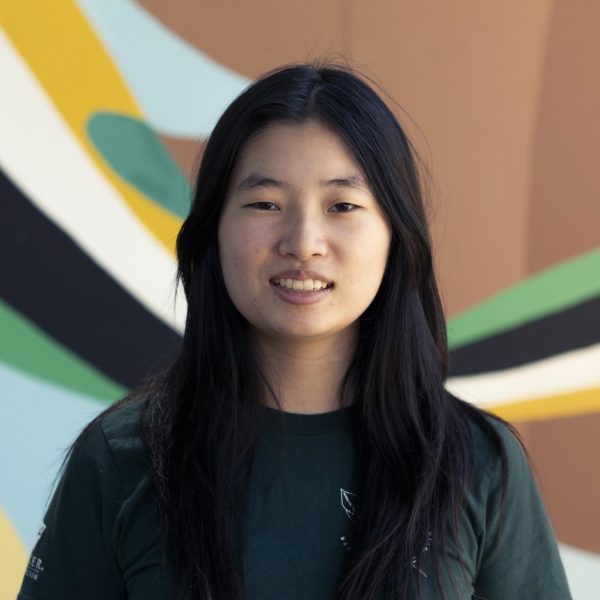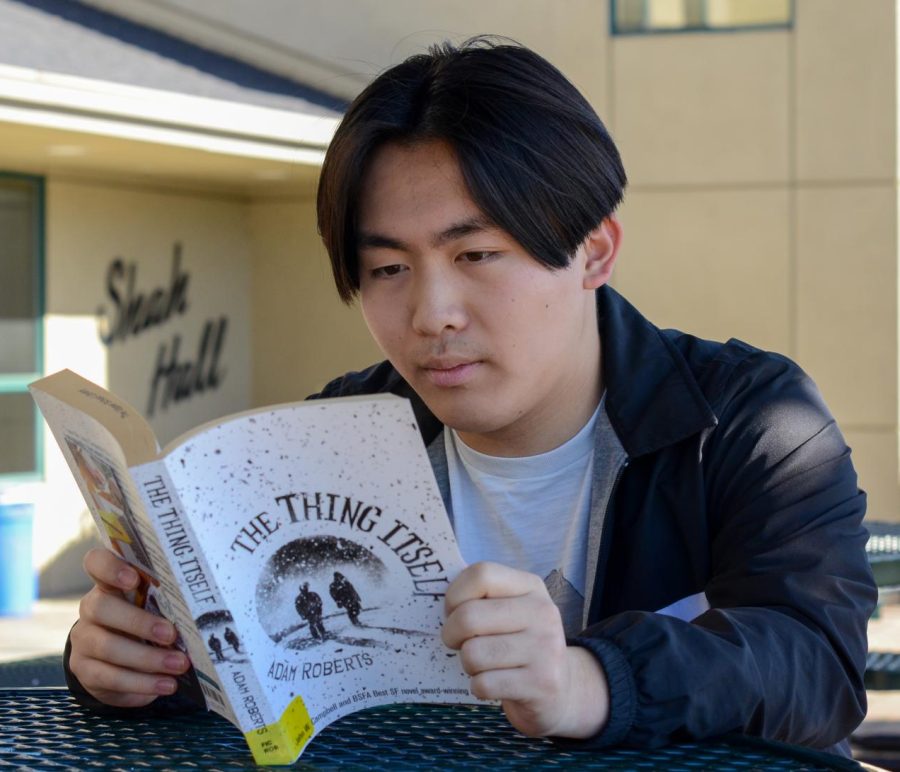Humans of Harker: Confronting conundrums
Vincent Zhang tackles the mysteries of our world through philosophy
“People think philosophy will get you nowhere, but we need to have people who think about the world philosophically. All the people who make change, like politicians and activists, are philosophers too. Whenever people espouse certain ideas about how the world should be, it’s philosophy. We all intuitively understand it,” Vincent Zhang (12) said.
When asked about their hobbies, some people think of sports, art or anything in between. But for Vincent Zhang (12), the answer doesn’t stop at swimming and research; in his free time, he also thumbs through volumes of philosophical works and ponders the questions of the universe.
His interest in philosophy started in his middle school years, when he picked up his first existentialist book. What he didn’t expect at the time was that this very subject would become integral to his identity today.
“[Philosophy] resonated with me, just like that,” Vincent said. “I got interested in it on a broader level because it’s the questions that come before everything else. Thinking about the world on a high level is important to understanding how we should function.”
Vincent emphasized the importance of philosophical works, while marveling at just how many of these concepts make it into modern films, politics, and culture in general.
“If you look at all these important thinkers, most people don’t actually read their works,” Vincent said. “People don’t read John Locke and Foucault, but these people’s ideas are still in the media and we talk about them all the time. It’s crazy that they wrote about really abstract, obscure ideas and they’re so important now.”
There are two types of philosophy: analytic and continental. Analytic philosophy concerns the structural, logical and mathematical analysis of the world, while continental philosophy, which Vincent prefers, encompasses everything from films to politics and focuses on a synthesis between them all.
“I love when philosophers talk about books or movies,” Vincent said. “It’s really cool when books or movies clearly reflect their ideas about society. It’s like art, a reflection of who we are as people, and it’s demonstrative of a lot of things that we might not realize.”
Vincent’s appreciation for philosophy only grew when he enrolled in Harker in ninth grade. Among all of the vibrant, multicolored poster boards at the upper school’s annual club fair, one of them particularly caught his eye –– Philosophy Club, a space for discussing various ideological concepts. Vincent joined the club on a whim and now leads Philosophy Club as an officer.
Jack Hsieh (12), a fellow member of Philosophy Club, described Vincent as an astute, curious and self-assured person. Jack noted Vincent’s curiosity for everything, down to their most minute aspects.
“He’s always passionate about what he talks about,” Jack said. “Something that I appreciate a lot is that he’s always willing to entertain the most absurd notions or conversations. To be perfectly honest, there’s not many people like him.”
Vincent’s role in Philosophy Club allows him to facilitate conversations pertaining to a wide range of philosophical ideas. Distilling information down to its raw connections makes these discussions so enjoyable for him.
“I like when [ideas] can be tied down to something important, like what’s good or bad in the real world,” Vincent said. “It’s nice to have discussions in Philosophy Club where people can be grounded in something and give examples and talk about it.”
Rupert Chen (12), who met Vincent through Philosophy Club in ninth grade, appreciates his consistent contributions to the club. Rupert views Vincent as a thoughtful, caring and hilarious individual who always brightens up the mood with his timely humor.
“One thing that I really like about him is how hardworking he was over quarantine,” Rupert said. “We had a Book Club series in Philosophy Club, and Vincent was one of the few people who was always there. Nobody else had the motivation or diligence to attend, but Vincent always did.”
Among all of the ideas that he’s read about, Vincent doesn’t have a single philosopher whom he takes inspiration from. Instead, he conglomerates all of the knowledge, taking tidbits from each individual work.
Yet, Vincent often struggles with the complexity and confusion that arises from written philosophy. While philosophers are good at putting down their ideas, interpreting and understanding those ideas can be challenging.
“[Sometimes] people compile excerpts of these important parts of the book that you should focus on, and then they’ll give their own summaries of it,” Vincent said. “But sometimes you can’t find those, and a lot of the time they’re also really dense and abstract. It’s hard, especially with a lot of the newer modern thinkers that people haven’t written that much on.”
Despite obstacles, reading philosophy has ultimately helped Vincent tune in with the world and current events. He noted that philosophy contributed to his increased interest in everything happening around him.
“Philosophy teaches you to really care about the world,” Vincent said. “A lot of philosophers are very politically radical, so reading philosophy, especially modern thinkers, has helped me become politically engaged and concerned with the state of the world.”
Although some may dismiss philosophy as a useless venture, Vincent disagrees. He believes that everyone, whether consciously or unconsciously, pursues and supports philosophical ideas on a daily basis.
“People think philosophy will get you nowhere, but we need to have people who think about the world philosophically,” Vincent said. “All the people who make change, like politicians and activists, are philosophers too. Whenever people espouse certain ideas about how the world should be, it’s philosophy. We all intuitively understand it.”
For two summers, Vincent participated in a program at a Stanford Center in China with several other high schoolers and graduate students, where he researched the country’s ecosystem and environmental policy.
“That work really interested me, and I like doing that kind of hands-on research,” Vincent said. “That’s really connected and important right now. It actually helps people. Even if that’s not what we’re doing with just writing papers, the results with the policy recommendations could help people.”
Ultimately, regardless of the situation, Vincent brings his unique and ever-evolving insights to the table. By making connections and thinking critically about each aspect of the world, he can unpack the enigmas of everything, one step at a time.
“Philosophy is worth it for everyone because we all think about it,” Vincent said. “Even if we don’t realize it, the world is changing so fast and people are pessimistic now about what’s going to happen. I think it’s important to get that in your head and say, what should we do about this? There’s so much potential for bad things to happen, and it’s important to be able to understand and put that into perspective.”

Claire Zhao (12) is a Managing editor for the Winged Post, and this is her fourth year on staff. This year, she looks forward to meeting new staff and...


















![“[Building nerf blasters] became this outlet of creativity for me that hasn't been matched by anything else. The process [of] making a build complete to your desire is such a painstakingly difficult process, but I've had to learn from [the skills needed from] soldering to proper painting. There's so many different options for everything, if you think about it, it exists. The best part is [that] if it doesn't exist, you can build it yourself," Ishaan Parate said.](https://harkeraquila.com/wp-content/uploads/2022/08/DSC_8149-900x604.jpg)




![“When I came into high school, I was ready to be a follower. But DECA was a game changer for me. It helped me overcome my fear of public speaking, and it's played such a major role in who I've become today. To be able to successfully lead a chapter of 150 students, an officer team and be one of the upperclassmen I once really admired is something I'm [really] proud of,” Anvitha Tummala ('21) said.](https://harkeraquila.com/wp-content/uploads/2021/07/Screen-Shot-2021-07-25-at-9.50.05-AM-900x594.png)







![“I think getting up in the morning and having a sense of purpose [is exciting]. I think without a certain amount of drive, life is kind of obsolete and mundane, and I think having that every single day is what makes each day unique and kind of makes life exciting,” Neymika Jain (12) said.](https://harkeraquila.com/wp-content/uploads/2017/06/Screen-Shot-2017-06-03-at-4.54.16-PM.png)








![“My slogan is ‘slow feet, don’t eat, and I’m hungry.’ You need to run fast to get where you are–you aren't going to get those championships if you aren't fast,” Angel Cervantes (12) said. “I want to do well in school on my tests and in track and win championships for my team. I live by that, [and] I can do that anywhere: in the classroom or on the field.”](https://harkeraquila.com/wp-content/uploads/2018/06/DSC5146-900x601.jpg)
![“[Volleyball has] taught me how to fall correctly, and another thing it taught is that you don’t have to be the best at something to be good at it. If you just hit the ball in a smart way, then it still scores points and you’re good at it. You could be a background player and still make a much bigger impact on the team than you would think,” Anya Gert (’20) said.](https://harkeraquila.com/wp-content/uploads/2020/06/AnnaGert_JinTuan_HoHPhotoEdited-600x900.jpeg)

![“I'm not nearly there yet, but [my confidence has] definitely been getting better since I was pretty shy and timid coming into Harker my freshman year. I know that there's a lot of people that are really confident in what they do, and I really admire them. Everyone's so driven and that has really pushed me to kind of try to find my own place in high school and be more confident,” Alyssa Huang (’20) said.](https://harkeraquila.com/wp-content/uploads/2020/06/AlyssaHuang_EmilyChen_HoHPhoto-900x749.jpeg)



